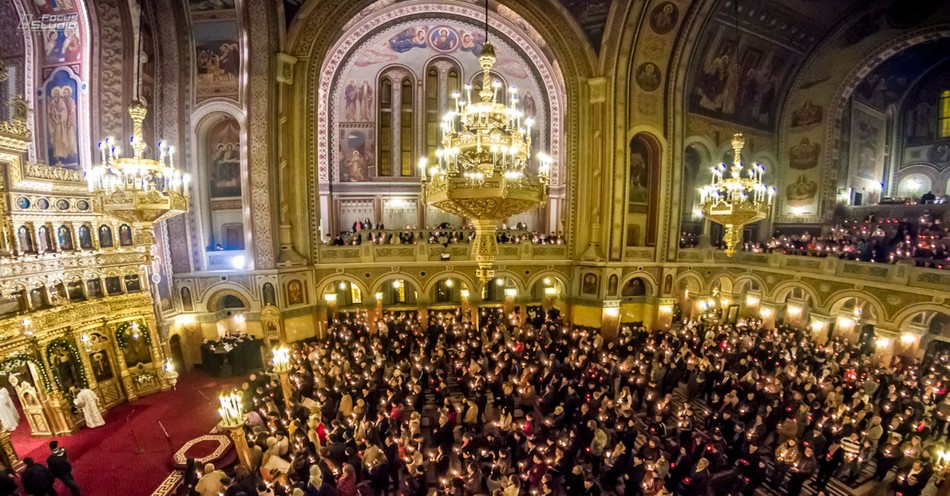The date for Orthodox Easter comes from following the Julian calendar, which differs from the Gregorian calendar used by most Western countries and Christian denominations. Consequently, Orthodox Easter often occurs a week later, closer to the March equinox.
Orthodox Easter in 2024
Orthodox Easter will fall on Sunday, May 5th, 2024, according to the Julian calendar used by much of Eastern Orthodoxy.
Easter for most Western Christians will occur this year on Sunday, March 31st, 2024, according to the Gregorian calendar.
Get your FREE Easter Guide here. Have encouragement delivered straight to your inbox!
Future Dates for Orthodox Easter (Pascha)
Pascha 2025 - April 20, 2025
Pascha 2026 - April 12, 2026
Pascha 2027 - May 2, 2027
Pascha 2028 - April 16, 2028
The Origin of Orthodox Easter
In 325 AD, the Council of Nicaea decided that Easter would be observed on the first Sunday after the first full moon on or after the March equinox. While the Council of Nicaea set the Easter date for most churches worldwide, not all Christian churches observe Easter according to the Gregorian calendar. Many Orthodox churches still witness Easter in congruence with the Julian calendar.
Why is the Orthodox Easter called Pascha?
The term "Pascha" for Orthodox Easter is derived from the Greek word "Pascha," which itself comes from the Hebrew word "Pesach." "Pesach" is the Jewish festival of Passover, which commemorates the Israelites' liberation from slavery in Egypt. The Last Supper of Jesus, which is associated with the Christian Eucharist, is believed to have been a Passover meal.
In Christian tradition, the resurrection of Jesus is often linked symbolically to the Passover, signifying a new liberation—this time from sin and death. The term "Pascha" has been used in Eastern Orthodox Christianity to emphasize this connection and to highlight the theological significance of Christ's resurrection during the Easter celebration.
Julian vs. Gregorian Calendar
The reason for the two different calendars actually came from a miscalculation of astronomy. The primary goal of creating the Gregorian calendar was to alter the time of Easter.
According to history.com, “In 1582, when Pope Gregory XIII introduced his Gregorian calendar, Europe adhered to the Julian calendar, first implemented by Julius Caesar in 46 B.C. Since the Roman emperor’s system miscalculated the length of the solar year by 11 minutes, the calendar had since fallen out of sync with the seasons. This concerned Gregory because it meant that Easter, traditionally observed on March 21, fell further away from the spring equinox with each passing year.”
Symbols and Traditions of Orthodox Easter
Although the dates may differ for Orthodox Easter, the traditions and meaning are nearly identical to those of other denominations, being a remembrance of the crucifixion and resurrection of Jesus Christ.
According to timeanddate.com,
“One of the most common Christian symbols associated with Easter is the lamb. It is often depicted with a banner that bears a cross, and it is known as the Agnus Dei, meaning "Lamb of God" in Latin. The symbol’s origin relates to the Jewish Passover. In ancient times the Jews sacrificed a lamb in the course of the festival. The early Christians associated the sacrifice of the lamb with Jesus Christ's sacrifice on the cross. They connected the joyous Passover festival, which celebrates the liberation of Jewish people from years of bondage in Egypt, with the liberation from death represented by the resurrection of Jesus Christ.
In Greece, Easter Sunday is also a widely celebrated occasion. Lambs are roasted on a spit and the provision of wine is abundant. The roasted lamb is served in honor of Jesus Christ, who was sacrificed and rose again on Easter. Lamb is the most traditional Greek Easter food. Red-dyed eggs are cracked against each other and the person with the last remaining uncracked egg will have good luck. Easter Sunday is a time of festivity and people eat, chat or dance throughout the night.”
Bible Verses about Easter
Acts 12:4 - And when he had seized him, he put him in prison, delivering him over to four squads of soldiers to guard him, intending after the Passover to bring him out to the people.
Romans 5:8 - But God shows his love for us in that while we were still sinners, Christ died for us.
Romans 4:25 - Who was delivered up for our trespasses and raised for our justification.
John 11:25-26 - Jesus said to her, “I am the resurrection and the life. Whoever believes in me, though he die, yet shall he live, and everyone who lives and believes in me shall never die. Do you believe this?”
Romans 1:4 - And was declared to be the Son of God in power according to the Spirit of holiness by his resurrection from the dead, Jesus Christ our Lord
1 Corinthians 15:42-44 - So is it with the resurrection of the dead. What is sown is perishable; what is raised is imperishable. It is sown in dishonor; it is raised in glory. It is sown in weakness; it is raised in power. It is sown a natural body; it is raised a spiritual body. If there is a natural body, there is also a spiritual body.
1 Peter 1:3 - Blessed be the God and Father of our Lord Jesus Christ! According to his great mercy, he has caused us to be born again to a living hope through the resurrection of Jesus Christ from the dead,
John 3:16 - For God so loved the world, that he gave his only Son, that whoever believes in him should not perish but have eternal life
Sources
Orthodox Easter Day - timeanddate.com
6 Things You May Not Know About the Gregorian Calendar - history.com
Image Credit: Wikipedia
Christianity.com's editorial staff is a team of writers with a background in the Christian faith and writing experience. We work to create relevant, inspiring content for our audience and update timely articles as necessary.




